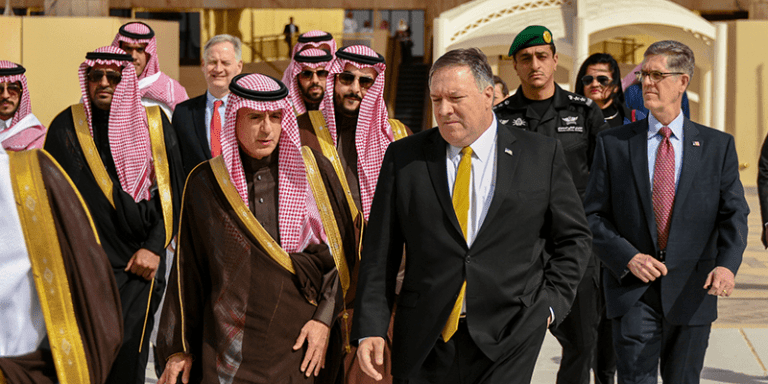
Since he began his run for the presidency in 2015, President Donald Trump has touted the many dangers Iran purportedly represents to the Middle East and to American interests in the region. Upon arriving in the Oval Office in January 2017, he initiated a series of steps to implement his rhetoric against the Islamic Republic. Most consequential has been his withdrawal from the landmark nuclear agreement, the Joint Comprehensive Plan of Action (JCPOA), that was signed by his predecessor Barack Obama in 2015. Trump also reinstated unilateral American sanctions previously lifted by the Obama Administration and he threatened countries and American and international companies if they violated them.
Trump’s agitation against Tehran and calls for confronting Iran have animated his administration and its officials. Recently, Secretary of State Mike Pompeo concluded an eight-country tour of the Arab world during which he sought to depict the United States as “a force for good” in the Middle East while painting Iran in the most negative light possible. To him, Iran’s malign activities pervade the region and threaten allies and American interests. He offered the United States as a reliable ally to lead and mobilize Arabs to stem the tide of Iranian expansionism from Yemen to Syria. Like the president, Pompeo again trumpeted a plan to establish a Middle East Strategic Alliance––an “Arab NATO” as some have called it––to include Gulf Cooperation Council states plus Jordan and Egypt to help make the confrontation with Iran possible.
To address this specific aspect of the American push against Iran, Arab Center Washington DC posed this question to its analysts: “How successful will the Trump Administration be in 2019 in forming a military alliance to confront Iran?” The following are their responses.
The Trump Administration Has a Serious Credibility Problem – Khalil E. Jahshan
Although Pompeo’s visit to the region was not as successful as the Trump Administration claims, it continues to cling tightly to its “Arab NATO” proposal. Washington, however, faces a serious credibility crisis attaining its Middle East objectives at three distinct but interrelated levels.
First, Trump has been quite vocal lately about his intention to pull out of NATO, and this could be tantamount to the organization’s demise. As receptive as they might be to strengthening their cooperation with Washington against Tehran, Arab allies cannot be blamed for questioning Trump’s motives for destroying the historic western alliance while calling for an “Arab NATO” to replace it in the Middle East. They could simply be asking themselves: how long would that last?
Second, the administration’s objective lacks credibility due to the absence of details regarding its conceptualization, mission, division of labor, and ultimate goals. Potential Arab participants share Washington’s concern about Iran’s aggressive and hostile activities, but they have not received enough assurances and persuasive details to join the campaign and commit the necessary resources to ensure its success.
The third challenge facing the administration is an internal or domestic one. Arab allies might be somewhat trusting of the United States, but they are learning quickly that the Trump Administration does not speak with one voice, nor does it necessarily speak on behalf of the US government—as Turkish President Recep Tayyip Erdoğan learned about the US withdrawal from Syria. While shuttling between Arab capitals to convince them otherwise, Pompeo was singing a different tune than his president or his colleague John Bolton, the national security advisor. Indeed, can Trump deliver the support of the US Congress or the American public for a confrontation, especially a military one, with Iran?
GCC States Would Do Well to Heed the Dangers – Imad K. Harb
Initially, it is hard to see how a military front against Iran could be formed in the Gulf while there is a festering crisis in the GCC that continues to divide the council’s potential participants. The Trump Administration does not even seem to be able to surmount any of the obstacles that stand in the way of reconciling the GCC’s members. As it stands today, Bahrain, Saudi Arabia, and the United Arab Emirates refuse to even discuss a compromise that could ameliorate their dispute with Qatar, a resolution that could presumably help all GCC states to coordinate their efforts to confront Iran.
On the other hand, this presumption may be built on an incorrect foundation: that all GCC states are indeed interested in a confrontation with the Islamic Republic. First, it must be clear to GCC states and the Trump Administration that the first victim of a confrontation with Iran is the GCC collective itself and its economic resources. While Iran is likely to sustain heavy losses in a military flare-up, the economic lifeblood of the GCC is sure to be devastated for a very long time with a serious upheaval in the Middle East. Second, it is hard to imagine that Kuwait, Oman, and Qatar would be interested in following Saudi Arabia and its cohorts in the GCC into such a confrontation. The three have had differing degrees of rapprochement with Iran and are not likely to go along with directly confronting it.
Finally, whatever the agitation against Iran, all GCC states are either busy addressing domestic concerns of costly economic reform or are involved in the Yemen war, making them unable to dedicate resources for a military alliance. In fact, Saudi Arabia’s Vision 2030 project is facing big difficulties in terms of assuring sufficient investment; the UAE’s economy is showing serious signs of retrenchment; Qatar is going full steam ahead toward its expensive World Cup in 2022; Kuwait, like others, is rethinking its social contract; and Bahrain and Oman are not well-endowed with natural resources. In summary, while some GCC states may wish they could build a military alliance capable of confronting Iran, that goal may be farfetched in 2019. Instead, the notion of the alliance could very well be the Trump Administration’s hidden path to the goal of normalizing Gulf relations with Israel, without much of a serious attempt at confronting Iran.
Iraq Is Too Beholden to Iran to Confront It – Abdelwahab Al-Qassab
It is undeniable that Iran’s malign activities in the Arab East have become too obvious and dangerous to ignore and thus require a serious plan to challenge them. But what is equally clear is that the plan the Trump Administration is devising to establish an “Arab NATO” is unlikely to succeed. In fact, if anything, the plan simply intends to publicly normalize what have already been clandestine relations between the Arab states and Israel.
Not much has transpired about Secretary Pompeo’s recent surprise visit to Baghdad and it is not known whether he discussed his plan with Iraqi officials. But if he did, it is not hard to surmise that he did not secure the Iraqi government’s approval. Despite the American-Iraqi strategic agreement that allows American forces to deploy in Iraq, the country’s political realities prevent Baghdad from signing on to a plan to confront Iran. Iran-supported militias have ample political and military power and clout in Iraq to prevent that from happening. First and foremost, they are beholden to Iran’s supreme leader, Ali Khamenei, and would not dream of joining a front against the Islamic Republic. Besides, planning the anti-Iran front only gives them more determination to work toward ending the American military presence in the whole country.
As for the government of Prime Minister Adel Abdul-Mahdi, it is in a great bind. Rumors in Baghdad are that Pompeo actually asked Abdul-Mahdi to disarm the Iran-supported militias—a tall order considering the government’s capabilities. What is sure, however, is that the Iranian leadership will use all its power and influence to resist any attempt by Abdul-Mahdi to attack its proxies in the country and to prevent him from joining any military alliance that would challenge its regional reach.
Trump’s MESA Push Serves Israel’s Interests – Tamara Kharroub
Israeli Prime Minister Benjamin Netanyahu has been the driving force behind pushing a narrative of Iranian aggression as the greatest threat to the region, opposing the JCPOA, and pressing the United States and its regional allies into military confrontation with Iran. Israel has a lot to gain from an Arab military alliance dedicated to countering Iran, and the signals indicate some Israeli involvement in this otherwise Arab coalition. The meeting that Pompeo held with the leaders of the proposed Middle East Strategic Alliance (MESA) member states at the UN General Assembly in August 2018 was reportedly attended by the Director of Israel’s Mossad Yossi Cohen. Former Defense Minister Avigdor Lieberman also supported the idea. Earlier reports even pointed to the notion that Israel was to be a “silent partner” in MESA.
Israel’s motivations for pushing an Arab military alliance against Iran can be summarized in three main points. First, the alliance is the best case scenario for Israel and the Trump Administration as Arab states would engage militarily with Iran on their behalf, without Netanyahu suffering diplomatically or the United States committing ground troops. Previous confrontations and new rounds of hostilities between Israel and Iran reveal that a full-blown war in Syria is unlikely; it is complicated and not in anybody’s interest, especially because the two countries do not share borders. At the same time, the eyes of Netanyahu and the hawkish duo in the Trump Administration (Bolton and Pompeo) are on the year 2020, when the UN Security Council is set to lift the conventional arms embargo on Iran under UNSC Resolution 2231. The Trump Administration and the Netanyahu government stand alone in this fight, and a military alliance and possible confrontation with Iran could turn the tables in their favor.
Second, the alliance presents Israel with the advantage of normalizing relations with Arab countries without the precursor of peace, as outlined in the Arab Peace Initiative (API) of 2002. While Arab states continue to pay lip service to the Palestinian cause and the API, members of the potential military alliance have all accelerated normalization dealings with Israel since Trump became president and Saudi Crown Prince Mohammed bin Salman took control in Riyadh. In fact, some reports even suggest that Saudi Arabia is considering purchasing missile defense systems from Israel. MESA is expected to spend over $100 billion in defense annually, presenting fertile economic and military opportunities for Israel along with the United States.
Third, the narrative of Iranian aggression has been used by Israel to divert political conversations from its commitments to international agreements and the peace process. Netanyahu is using this pretext to advance his expansionist policies, particularly in illegal Israeli settlements, Jerusalem, and the Golan Heights—while at the same time normalizing relations with Arab states and avoiding an agreement to a Palestinian state along the 1967 line with East Jerusalem as its capital.
Despite Netanyahu’s efforts to push for a military confrontation with Iran, the proposed Arab military alliance has several hurdles to overcome and is unlikely to materialize in the near future. But one thing is clear: the political conversation will remain focused on Iran at the expense of important issues in the region, including the continuous Israeli occupation of Palestinian land, Saudi human rights violations, the entrenched autocracy in Egypt and elsewhere, and the Trump Administration’s disproportionate and shortsighted emphasis on the threat of “radical Islamism” and Iran while neglecting to prioritize human rights. Now with the upcoming Israeli election and his possible indictment, Netanyahu needs this alliance and diversion more than ever.




